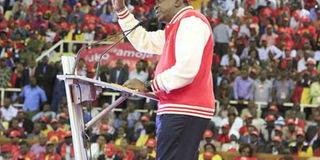Uhuru, Ruto unity makes it hard for Nasa to have victory

President Uhuru Kenyatta addressing Jubilee Party members during the launch of the membership smart card on January 13, 2017 at the Safaricom Kasarani Stadium, Nairobi. Eruption of violence will see ICC coming back to haunt President Kenyatta and Mr Ruto. PHOTO | JEFF ANGOTE | NATION MEDIA GROUP
What you need to know:
- Jubilee makes it difficult for Nasa/Raila to play the anti-Kikuyu card (the 41 against one gambit) used in 2007.
- Anti-corruption crusade and other planks of the opposition are not producing anything close to a Moi regime out of Jubilee.
What is at stake in the August 8 2017 elections?
Ordinarily, 2017 would not be a high stakes election.
Unlike the post-2002 period, when former President Mwai Kibaki’s NARC was internally polarised between NAK and LDP, the Jubilee government has pretty much managed to hold together.
The demographic “tyranny of numbers” that swept Jubilee to power is not just intact, but it has plausibly expanded.
Efforts to neutralise Cord’s charge that Jubilee has an inclusion deficit (the two against 40 propaganda) since 2014 has pushed the ruling party to create the proverbial “face of Kenya”, including picking its secretary-general from Luo Nyanza.
Accordingly, Jubilee strategists are targeting a 65 percent-70 percent victory in August to “end” politics and enable President Kenyatta to consolidate his legacy of development.
Unlike in 2013, when the ICC cases hang over the heads of the Jubilee duo, in 2017, they are free.
For Jubilee and Kenya, the August 8 2017 election is evolving into a high stakes affair.
First, the 2022 transition has cast a long shadow over the August 8 poll.
The prospect of Jubilee’s youthful leaders monopolising power for 20 years is drawing the worst of resistance from the older generation in ODM/CORD/Nasa axis in the opposition.
What will decide the winner?
I recall dismissing the “tyranny of numbers” thesis popularided by Kenyan political scientist Mutahi Ngunyi ahead of the 2013 elections as simplistic and lazy way of thinking, albeit influential.
Democracy is a tyranny of the majority with only the Constitution providing guarantees for the minority.
What Mutahi meant is tyranny of “ethnic majorities”.
The problem is that the Kikuyu (22 per cent) and Kalenjin (12 per cent) can only account for 36 per cent of the popular vote.
The big question is: How did Jubilee mobilise the remaining 14.7 per cent to close the 50 per cent plus one threshold?
The answer is a combination of ICC and the age divide or the clash of generations.
The clash of generations, especially involving the Moi dynasty in the Rift Valley and the Odinga dynasty in Nyanza remains a potent mobilising factor.
Jubilee makes it difficult for Nasa/Raila to play the anti-Kikuyu card (the 41 against one gambit) used in 2007.
Currently, both Nasa and Jubilee need a galvanizing factor such as freedom (1963) or ICC (2013) to significantly sway the numbers.
Momentum for Cord and other parties to unite seems to be building up. Can a 2002-like euphoria work in 2017?
RUN-OFF COALITION
It is clear that opposition strategists are working towards a 2002-like euphoria.
What is lacking is the equivalent of an anti-Moi galvanising factor to unite the opposition.
Second, a break-away within the ruling Jubilee, as it happened with Kanu in 2002, to swell the ranks of the divided opposition, is unlikely to happen.
It is a no brainier that if Ruto were to decamp from Jubilee the way Saitoti did in 2002, Uhuru’s goose would be cooked.
But now, Ruto is de facto chief campaigner, strategist and crown prince of Jubilee.
A 2002-like scenario is a good idea, but a pipe dream.
Anti-corruption crusade and other planks of the opposition are not producing anything close to a Moi regime out of Jubilee.
More significantly, Cord’s plunge into discord has left only ODM and Amani National Congress as the two camps trying to unite.
It is unlikely Mr Raila will say “Mudavadi Tosha” or the latter to say “Raila Tosha”.
I see Nasa as a run-off coalition, not a pre-election coalition.
Even if they all agree on a single “Tosha” candidate, the demographic odds are stuck against Nasa.
Remember, all the Nasa chiefs without exception lost to Jubilee in 2013.
JUBILEE VOTE
Looking at the mood right now, are Kenyans prepared for a regime change or are they prepared for five more years under President Uhuru Kenyatta and Deputy President William Ruto?
The vast majority of Kenyans seem to think that the real battle line is 2022, the Kenyatta succession.
But a small action of intellectuals and civil society think that 2017 is “the year of revolution”.
Democracy or no democracy, they must seize power or Kenya will burn.
This kind of thinking underpins the pervading nihilism and assault of institutions currently going on.
Read my lips, Kenya will vote President Kenyatta and Jubilee, not for its achievements, but for peace and stability.
What do the incumbents have to lose, and how far do you think they will go to win?
It all boils down to the ICC factor. This time around, the international community has strategically kept silent to avoid winning the election for Jubilee as they did in 2013.
But within Jubilee, they are looking at Cote d’Ivoire where the ICC was used to deal with a disputed election.
Eruption of violence will see ICC coming back to haunt President Kenyatta and Mr Ruto.
If they lose, the ICC and its promoters will most likely reactivate the cases, re-engineer a further investigation into 2007/8 violence and quickly mount pressure on the new ruler to hand over the Jubilee leaders to The Hague for custody as investigations commence.
2017 is do or die for Jubilee. Jubilee has to win.




